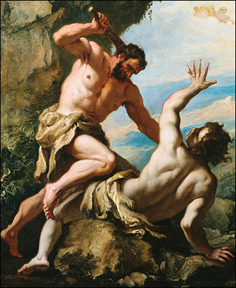 |
| http://67.media.tumblr.com/tumblr_l7i7esa09K1qcr6iqo1_1280.jpgn |
Revelation 12:7 - 12:9 (KJV)
7 And there was war in heaven: Michael and his angels fought against the dragon; and the dragon fought and his angels.
8 And prevailed not; neither was their place found any more in heaven.
9 And the great dragon was cast out, that old serpent, called the Devil, and Satan, which decieveth the whole world: he was cast out into the earth, and his angels were cast out with him.
Both are righteous warriors fighting against the forces of evil. Beowulf even fights against a dragon for his final battle. I think this represents Beowulf fighting against Lucifer himself, but what about the other two monsters Beowulf faces? Do they resemble other evil biblical characters who would side with the Dragon?
 |
| http://vignette2.wikia.nocookie.net/biblestudy/images/0/02/Cain-Abel.jpg/revision/latest?cb=20160716193740 |
Grendel's mother could be said to also represent Cain's lineage, but I think she has many similarities with a less known apocryphal character from Judaeo-Christian tradition. Grendel's mother parallels Lilith, a figure in Jewish biblical mythology who is said to be Adam's original wife.
 |
| http://www.supernaturalwiki.com/images/thumb/1/1e/Lilith-JohnCollier.jpg/150px-Lilith-JohnCollier.jpg |
According to the myth, God created man and woman at the same time during Creation. God wanted Lilith to be subservient to man, but she refused and, as a result, was exiled from the Garden of Eden. The creation story then proceed as usual, having Eve created from the rib of Adam. The character of Lilith is portrayed as a demonic female which is fairly similar to the depiction of Grendel's mother. One telling of Lilith's story has her bearing a child with Adam prior to her departure from the Garden. This child was Cain.
It would be very interesting to see how other mythologies, especially Scandinavian mythology, influenced Beowulf as each has its own portrayal of the battle between good and evil.
The connections between Christianity and Beowulf is obvious and our discussion in class definitely prove your point. It reminds me of your group presentation and how Beowulf influenced Harry Potter and Star Wars. We are in an endless cycle of influences and everything seems to stem from Christianity and the battle between good and evil. Beowulf is supposed to represent the good against evil, but it does not feel the way after your comments in class. You mentioned that Beowulf does not really care about revenge or fighting this battle against Grendel’s mother. He is just someone who is getting paid to get the job done. I think that makes his battle against evil not as noble. So, does that mean that he does not represent the good? If he doesn't, then what does he represent?
ReplyDeleteRafael, I agree with you in the fact that there is a clear relationship between Christian undertones and the Beowulf text. That mindset provides an intriguing allegory through which one can examine the plot in the poem. Within your blog post, you made clear connections to possible references that characters may resemble in Beowulf from other religious stories. However, at this point in the text, I do not see Beowulf as a "messianic figure" in a Christian context that you describe him as in this post. Clearly, as was discussed in class, Beowulf possesses his share of flaws, further blurring the line between good and evil within the story. The overt pride, boasting of accomplishments, and arrogance that distinguishes his character does not stand out as qualities that come to mind when I think about a Messiah-like individual. Certainly, Beowulf is the protagonist of the poem, but there is definitely more to be examined and debated about his personality.
ReplyDeleteThis comment has been removed by the author.
ReplyDeleteYour insight into Grendel's mother's possible connection with Lilith is very interesting. With this interpretation, the land of the Danish people could be thought of as the Garden of Eden. Unfortunately, we don't get too many details from "Beowulf" about her past to make a strong argument. Although Grendel is like Cain in certain ways, I think it's possible that he, and his mother, were described as Cain's descendants to also further justify their identities as the monsters. The prospective audience for "Beowulf" may have been Christians that were familiar with the story of Cain, thereby strengthening their hatred of Grendel.
ReplyDeleteYour insight into Grendel's mother's possible connection with Lilith is very interesting. With this interpretation, the land of the Danish people could be thought of as the Garden of Eden. Unfortunately, we don't get too many details from "Beowulf" about her past to make a strong argument. Although Grendel is like Cain in certain ways, I think it's possible that he, and his mother, were described as Cain's descendants to also further justify their identities as the monsters. The prospective audience for "Beowulf" may have been Christians that were familiar with the story of Cain, thereby strengthening their hatred of Grendel.
ReplyDeleteI agree with you, in that it would be interesting to pinpoint exactly what influences other mythologies had on Beowulf. Unfortunately, I don't know enough about the various types of paganism to really point anything out. Likewise, because the text seems to be about transitioning from older beliefs to Christianity, the exact nature of older views isn't very clear. However, I suppose that the most obvious would be the long-standing warrior-culture evident in the text. This is something which I find very interesting, because we still romanticize it today - in spite of society's transition to predominantly Christian values. I can only wonder what other parts of our lives have held out against changing times and cultures.
ReplyDelete